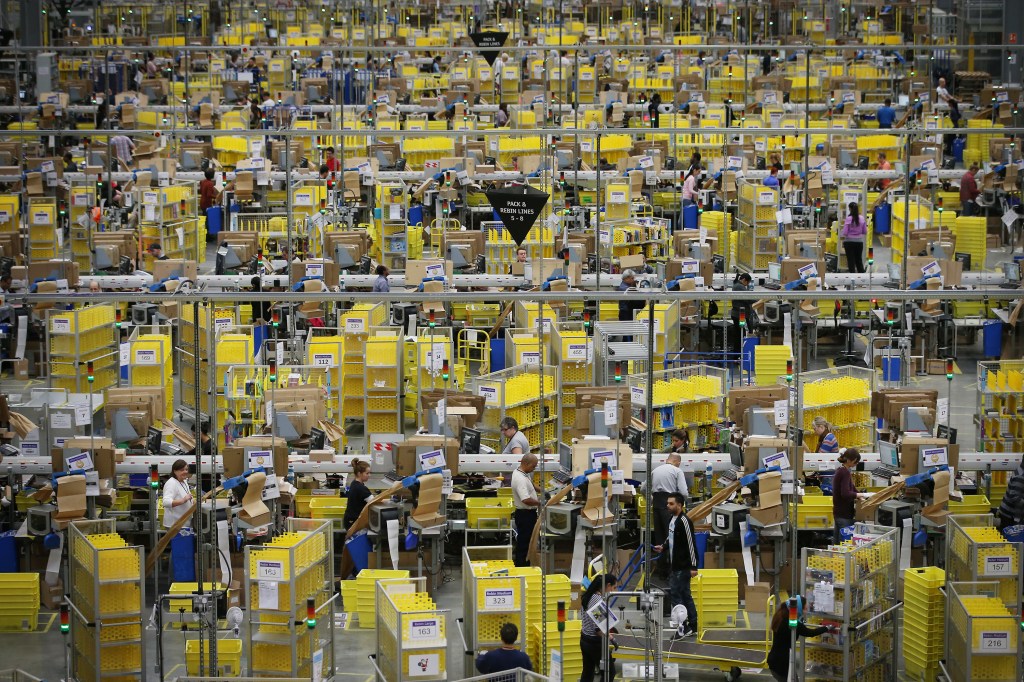California’s labor regulator has announced it has fined Amazon almost $6m for violating a state law aimed at curtailing the use of onerous warehouse productivity quotas by mandating greater disclosure in this area.
The California Labor Commissioner’s Office said it investigated two Amazon facilities in Moreno Valley and Redlands and found 59,017 violations of the state’s Warehouse Quotas law. Penalties were charged at $100 per violation.
Notice of quotas, discipline required
The law, enacted in 2021, requires warehouse employers to provide workers with written notice of quotas they need to follow. The notice must include the number of tasks workers are expected to complete in an hour and detail the disciplinary actions that would be taken for failing to meet the quota.
The law also prohibits employers from requiring warehouse employees to meet unsafe quotas preventing them from taking state-mandated meal and rest breaks or using the bathroom. The law specifically states: “A quota may be illegal if it is not disclosed to workers or precludes employees from exercising these statutory rights.”
Amazon was found to not have provided the written notices in an almost five-month period. Specifically, the Labor Commissioner’s Office identified 59,017 violations of the law in the two warehouses over a five-month period between October 20, 2023, and March 9, 2024.
Amazon “failed to provide written notice of quotas,” the Labor Commissioner’s office said. “The peer-to-peer system that Amazon was using in these two warehouses is exactly the kind of system that the Warehouse Quotas law was put in place to prevent,” Labor Commissioner Lilia Garcia-Brower said in a statement to news outlets.
A federal bill was just introduced this week by Senator Edward Markey (D-MA), mainly in response to California’s actions against Amazon.
Amazon, the second-largest private employer in the US, has said it doesn’t use fixed quotas; instead, it relies on “performance expectations” that factor in multiple indicators, such as how certain teams at a site are performing. The company has disputed allegations that employees don’t get enough breaks.
Amazon has also defended its safety record. The company said in March that its injury rates have improved, and it announced plans to invest more than $750m in safety initiatives this year.
Maureen Lynch Vogel, an Amazon spokesperson, said the company disagrees with the allegations and has filed an appeal.
Productivity quotas
Productivity quotas have become a common source of consternation among Amazon workers, regulators and lawmakers.
Amazon has faced scrutiny over how it treats its warehouse and delivery employees, with critics specifically examining the pace of work required of employees, arguing that the speed requirements put workers at greater risk of injury.
The Labor Department’s Occupational Safety and Health Administration has also cited Amazon numerous times for safety violations. Amazon has said it would appeal all the citations.
The Occupational Safety and Health Administration (OSHA) issued citations against Amazon at six warehouses in December 2022, January 2023 and February 2023 over unsafe working conditions, ergonomic hazards and failure to properly report injuries. At the time, OSHA said Amazon “willfully” violated workplace safety laws by requiring employees to work at such a fast pace that it put them at higher risk of musculoskeletal disorders or problems, such as the sprains and strains often caused by repetitive tasks.
Besides California, several other states – New York, Minnesota, Oregon and Washington – have passed warehouse worker safety laws aimed at protecting workers in the warehousing and storage, merchant wholesaler, electronic stores, mail-order house, courier and express delivery service industries. And a federal bill was just introduced this week by Senator Edward Markey (D-MA), mainly in response to California’s actions against Amazon.












